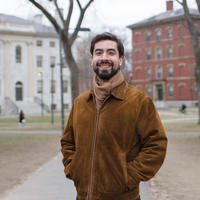
aarraiza@wellesley.edu
Spanish & Portuguese
B.S., University of Puerto Rico-Rio Piedras; Ph.D., Harvard University
Antonio J. Arraiza Rivera
Assistant Professor of SpanishResearch and teaching interests: early modern Spanish literature, visual culture and Luso-Castilian bilingualism, theories of poetic inspiration, literature in language teaching.
My work focuses on sixteenth and seventeenth century Spain and Portugal, a period of extraordinary cultural activity commonly known as the Golden Age or 'Siglo de Oro". I am interested in understanding how authors portray themselves in their work at a time when their countries had become global powers. One of the most stimulating challenges of studying and teaching the cultural production of these centuries is addressing what is modern about "early modern". Much like our age, early modernity in the Iberian Peninsula was characterized by rapid technological changes, linguistic plurality and the presence of writers who were willing to experiment with language, all the while thinking critically about their role in society.
These are some of the issues that I examine in my book manuscript Impresas ansias: poéticas de la escritura en Villamediana, Sor Juana y Melo, in which I analyze depictions of writing in the work of three different poets from Spain, Portugal and Vice-regal Mexico. I propose that to write about writing becomes a privileged place to theorize about difference: geographic, linguistic, social and even technological. As seventeenth century poets depict themselves engaged in their craft, they are able to subvert conventions regarding artistic influences and dynamics of aristocratic patronage. The result is the foregrounding of a new-found sense of artistic autonomy that enabled authors to establish networks of collaboration with like-minded peers, and contribute to the burgeoning notion of lyric poetry.
My other ongoing projects explore how writers think about issues such as national belonging, writing in more than one language, or writing in relation to painting. These include an analysis of the works of seventeenth century Portuguese bilingual poets in the context of Portugal's political ties to Habsburg Spain, and a study on the relationship
between painting and poetry in the work of Pablo de Céspedes, Gabriel Bocángel and the conde de Villamediana.
For me, teaching and research are all about establishing interdisciplinary connections. I think teaching language and literature are mutually complimentary, and I strive to make the classroom a space where students engage with and through language, making texts relevant to their own experiences as readers in an ever more globally connected world.
My work is also informed by a desire to reconstruct the rich visual and aural world of early modernity, which explains why material culture (manuscript and printed editions, paintings, engravings, music) occupies an important place in my classes and research.
I have carried out archival work in Spain and Portugal's National Libraries, and given conferences at Madrid's Academia del Cervantismo and at the Observatorio del Instituto Cervantes in Cambridge. I taught language and literature courses at MIT, BU, and Harvard before joining the Spanish Department here at Wellesley.
In my spare time I enjoy swimming, drinking coffee, and hiking. I am also known to be a mildly proficient cartoonist and a huge fan of soup dumplings.
